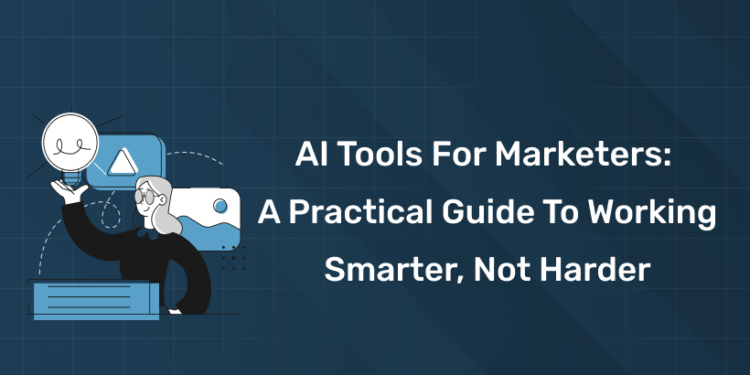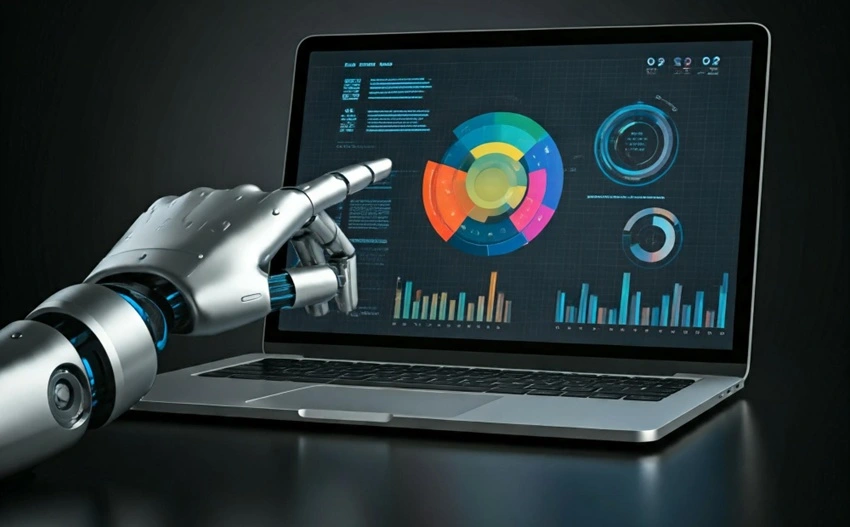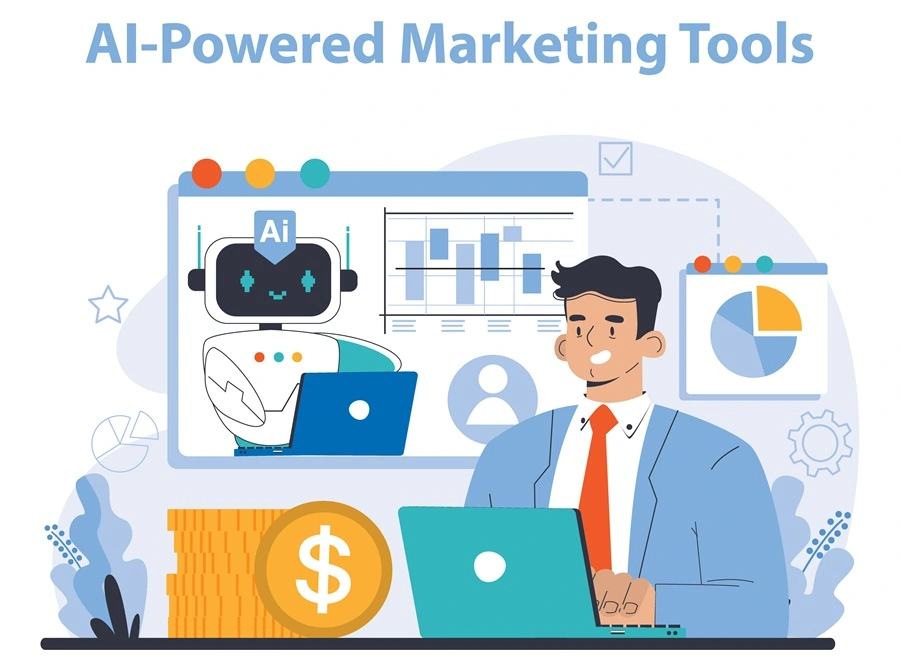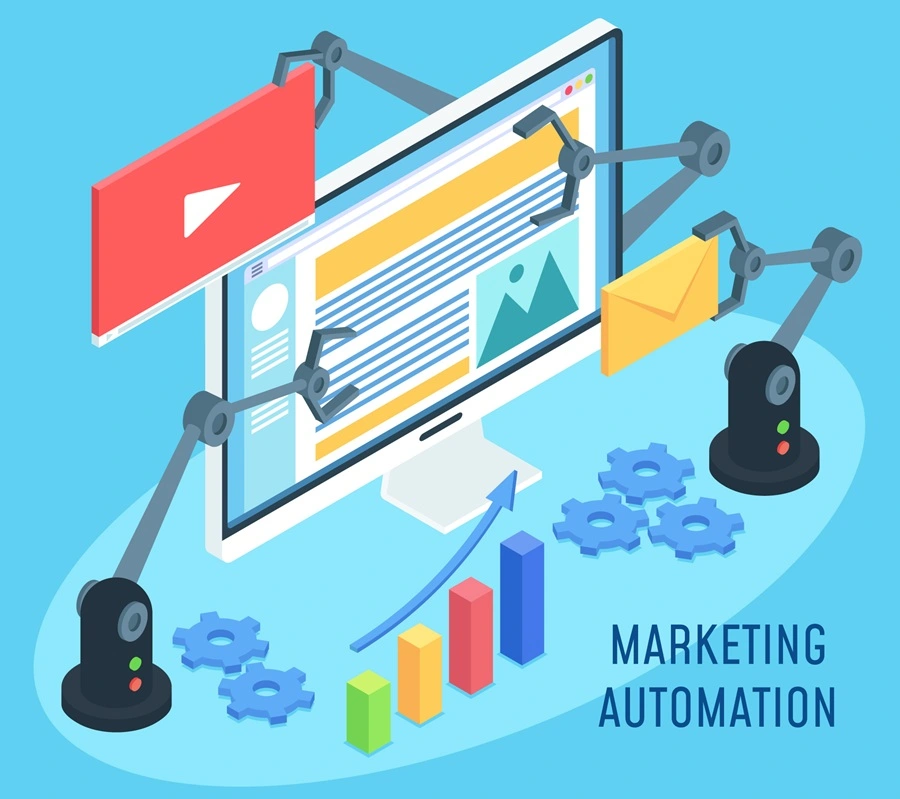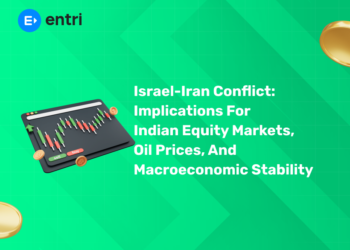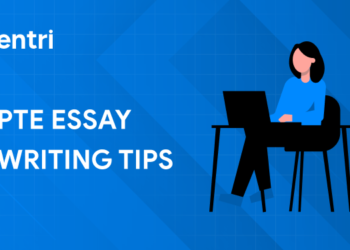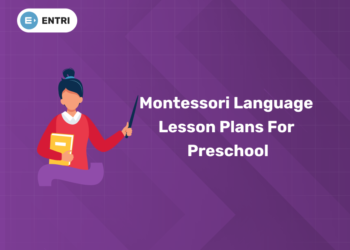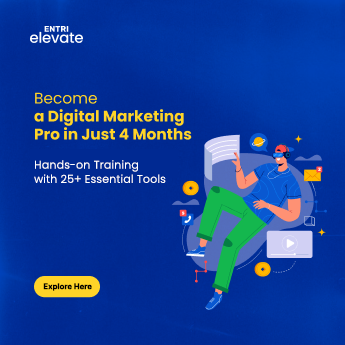Table of Contents
Key takeaways
- AI tools don’t replace marketers – they remove grunt work so you can focus on strategy, creativity, and clients.
- Think in categories (research, content, social, ads, analytics, automation) instead of chasing every shiny new tool.
- Even free or low-cost AI tools can dramatically boost productivity for freelancers, small businesses, and agencies.
- The most effective marketers combine human insight + AI speed to personalise campaigns at scale.
- Start with 3–5 core tools, measure impact (time saved, revenue, leads), and then upgrade – not the other way around.
Why AI tools are suddenly everywhere in marketing
If you work in marketing today – or you’re planning to – you’ve probably felt it:
- Clients want more campaigns
- on more platforms
- with more personalisation
- in less time
- and for less money.
Meanwhile, AI tools exploded into the scene. What started as “let’s try this chatbot for captions” has turned into full-blown AI stacks that write content, design creatives, optimise ads, and predict which lead will convert next.
But here’s the problem: most marketers are overwhelmed.
- Too many options – every week there’s a “Top 30 AI tools” type article.
- Too much jargon – LLMs, agentic AI, multimodal, embeddings…
- Too little clarity – Which tools actually matter for my job?
This guide is meant to be your calm in that chaos.
We’ll walk through how AI tools fit into the real marketing workflow, which types you should actually care about, and how to build a simple, sustainable AI stack – especially if you’re a student, freelancer, or early-career marketer in India or similar markets.
Join Our Online Digital Marketing Course & Learn the Fundamentals!
What exactly are “AI tools for marketers”?
1: What is the primary goal of SEO (Search Engine Optimization)?
In simple terms:
AI tools for marketers are software that use artificial intelligence to automate or assist tasks across the marketing funnel – from research to reporting.
Instead of you:
- manually analysing spreadsheets,
- writing 50 ad variations, or
- checking campaigns every hour,
AI tools can:
- spot patterns in your data,
- generate copy and creatives, and
- automatically adjust campaigns based on performance.
You still decide the strategy, tone, audience, and brand boundaries. AI just speeds up the work and gives you better options to choose from.
Become an AI-powered Digital Marketing Expert
Master AI-Driven Digital Marketing: Learn Core Skills and Tools to Lead the Industry!
Explore CourseWhy AI Tools Matter for Marketers in 2026
A few reasons AI has moved from “nice to have” to “must learn”:
1. Volume & speed
You’re no longer competing with just a few brands. You’re competing with hundreds of accounts in your niche, all publishing daily.
AI can help you:
- Draft content faster
- Test more ad variations
- Respond quicker to trends
2. Data overload
Platforms like Google Ads, Meta Ads, and analytics tools generate huge amounts of data. AI-based PPC and analytics tools can:
- Spot patterns humans miss
- Auto-adjust bids
- Flag issues like spend spikes or broken tracking
3. Cost & ROI pressure
For Indian businesses – especially SMEs and students starting out – budgets are tight.
AI tools, when used right, help:
- Reduce wasted spend
- Improve CTR and conversion rates
- Automate parts of work agencies charge premium for shopify.
The Modern AI Marketing Stack: Key Tool Categories
Think of your AI tools like a toolbox, not one magic button.
Below are the main categories. In your future cluster blogs, you can dig deeper into each.
1. AI Tools for Research & Strategy
Before content, ads or reels – you need clarity: Who are you talking to? What are they searching for? What is already working in the market?
Types of tools:
- AI chat assistants (for brainstorming, angle exploration, audience personas)
- SEO & competitive research platforms with AI layers
- Trend & topic tools that surface what’s hot now
Examples:
- ChatGPT / other LLM-based assistants – for brainstorming messaging angles, audience personas, content outlines and campaign ideas.
- Semrush / Ahrefs / Similarweb with AI features – for keyword research, competitor ad & content analysis, traffic patterns.
- Surfer SEO, ContentShake AI – use AI to connect keyword data with content structures that can rank.
How a beginner might use this stack:
- Ask an AI assistant to outline 3–4 customer personas for your product
- Use an SEO tool to validate their search behaviour
- Turn those insights into a simple content calendar or ad testing plan
2. AI Tools for Content & SEO
Content is still the engine of most organic visibility – but writing everything manually is slow.
Modern AI content tools are not just about “write me a blog”. They help with:
- Topic & outline generation
- Drafting and improving copy
- SEO optimisation (headings, internal links, semantic keywords)
Examples:
- Jasper, Writesonic, Copy.ai – AI copy platforms trained heavily on marketing use cases. They offer templates for blogs, landing pages, ad copy, emails etc.
- Surfer SEO, Clearscope, Frase – content optimisation tools that analyse SERPs and help you structure content around the right topics, headings and related keywords.
Good practice:
Use AI to accelerate first drafts, outlines, and repurposing, then refine with your own expertise, local context and brand voice. Even Entri’s own AI-in-content marketing blogs emphasise using AI as a co-pilot, not a replacement.
3. AI Tools for Social Media Marketing (SMM)
Social media now demands constant content: posts, reels, shorts, carousels, captions, replies.
AI tools here focus on:
- Caption and hook ideas
- Post scheduling and best-time suggestions
- Design & video creation
- Social listening and sentiment analysis
Examples:
- Hootsuite + OwlyWriter AI – lets you generate captions, ideas and even copy using proven formulas like AIDA, PAS, WIIFM directly inside the scheduler.
- Buffer’s AI Assistant – helps brainstorm, write and repurpose posts across platforms.
- Canva AI & its new “Creative Operating System” – AI for images, carousels, thumbnails, basic videos, and now even campaign layouts from simple text prompts.
- Predis.ai, Lumen5, Pictory, Kapwing AI – text-to-video tools that turn scripts or blogs into short videos/reels.
We’ll explore these in detail in a future “AI Tools for SMM” blog.
4. AI Tools for PPC & Performance Marketing
This is where AI is arguably most powerful – and also most underused by beginners.
AI in PPC helps with:
- Smart bidding & budget allocation
- Ad copy and creative testing at scale
- Audience discovery and predictive targeting
Examples:
- Google Ads’ own AI (Smart Bidding, Performance Max) – automates bids, placements and creative combinations based on conversion signals.
- Optmyzr – advanced AI co-pilot built by ex-Google engineers for Google Ads, Microsoft Ads, Amazon Ads, Meta etc., with optimisation “recipes” and rule engines.
- AdCreative.ai – generates data-backed ad creatives and copy for Meta, Google, LinkedIn and more, trained on millions of ad performance data points.
- Other AI PPC tools include Adzooma, Revealbot, and platform-native automation for budget pacing and bid strategies.
In our future “AI Tools for PPC” article, we can break down case studies, workflows and risks (like over-trusting automation without good conversion tracking).
5. AI Tools for Email, CRM & Personalisation
Email still delivers one of the highest ROIs in digital marketing – and AI pushes it further.
AI can:
- Segment users based on behaviour
- Trigger personalised journeys
- Optimise subject lines and send times
- Generate personalised content blocks
Examples:
- HubSpot AI tools – AI-assisted subject lines, email copy, send-time optimisation and content recommendations layered on top of CRM data.
- Klaviyo, Mailchimp, Brevo (Sendinblue) – increasingly layering AI for segmentation, predictive churn/CLV, and content generation.
The big picture: AI handles the heavy data lifting so you can focus on strategy and storytelling in your campaigns.
6. AI Tools for Analytics, Reporting & CRO
Marketers often lose hours every week on reporting and manual analysis.
AI tools can:
- Auto-generate dashboards and weekly summaries
- Highlight unusual changes (spikes, drops, anomalies)
- Suggest experiments (A/B tests, landing page tweaks)
Examples:
- Google Analytics 4’s AI insights – anomaly detection and predictive metrics (like churn probability).
- Hootsuite / Buffer / other suites – AI that surfaces best-performing posts, content types and optimal posting times.
- Dedicated CRO tools now use AI to suggest UX changes and prioritise A/B tests based on impact probability.
In your later deep-dive blogs, you can show screenshots, report templates and how to interpret AI-driven suggestions without blindly following them.
How to choose the right AI tools
Before you subscribe to anything:
1. Start with your bottlenecks, not with tools
Ask:
- Where do I waste the most time every week?
- Which tasks are repetitive but important?
- Where do I keep postponing work because it feels heavy?
If your biggest pain is creating weekly content, start with copy + social tools.
If your pain is messy data and reporting, start with analytics + automation.
2. Use the 3–3–3 rule
For each new tool, be clear:
- 3 tasks it will replace or speed up
- 3 hours per week you expect to save
- 3 weeks to properly test and decide
If you can’t answer those, you’re probably just experimenting – which is fine, but don’t treat it as a “must-have” yet.
3. Favour tools that play nicely together
For Indian and global marketers alike, look for tools that:
- Integrate with Google Analytics / Search Console
- Connect with major ad platforms
- Export data easily (CSV, Sheets, APIs)
Your future self (or your agency boss) will thank you.
Become an AI-powered Digital Marketing Expert
Master AI-Driven Digital Marketing: Learn Core Skills and Tools to Lead the Industry!
Explore CourseCommon mistakes marketers make with AI tools
Let’s be honest about the traps.
1. Copy-paste publishing
AI gives you a neat blog draft or ad copy and you publish it as-is.
Risks:
- Generic tone that sounds like everyone else
- Factual mistakes (especially in finance, health, or law)
- No local nuance (for markets like India – regulations, culture, examples)
Always add your own voice, experience, and context.
2. Tool-hopping and subscription overload
Every month:
New tool → New trial → New subscription → No real impact.
Instead:
- Commit to a small stack and master it.
- Track time saved and revenue/leads generated.
- Upgrade only after you’ve extracted value from the basics.
3. Ignoring data privacy and compliance
If you work with client data, check:
- What data the tool stores
- Where the servers are located
- Whether you can turn off training on your data
Your reputation as a marketer also depends on how responsibly you handle data.
A simple AI stack for different types of marketers
If you’re a student or aspiring digital marketer
Focus on tools that teach you the fundamentals plus AI:
- 1 general AI assistant for research & brainstorming
- 1 copy + social tool to practice campaigns
- 1 SEO helper to understand keywords and on-page structure
- 1 basic analytics platform (GA4 + simple dashboards)
Your goal here is fluency, not perfection.
If you’re a freelancer or solo consultant
You need tools that make you look “bigger” than a one-person team:
- AI-assisted content + ads (to scale output)
- Social media AI helper (to show up consistently)
- Automation/CRM to follow up with leads
- Reporting tools that turn data into simple client decks
If you’re in-house at a brand or agency
Your focus shifts to systems:
- Collaborative content and campaign tools
- Strong analytics + attribution
- AI-powered experimentation (A/B testing, creative testing)
- Workflows that connect marketing, sales, and support
Where Entri’s AI-Powered Digital Marketing Course fits in
If all of this feels exciting but also slightly overwhelming, you’re not alone. Most marketers were never formally taught how to:
- choose AI tools,
- design prompts,
- read AI-generated insights, or
- build automated funnels.
That’s exactly where a structured program helps.
In Entri’s AI-powered Digital Marketing course, you can expect to:
- Learn the core pillars of digital marketing – SEO, social, performance ads, email, analytics – and then layer AI on top.
- Get hands-on practice using popular AI tools for content, creatives, ads, and reporting.
- Work on real-world projects relevant to Indian and global brands.
- Understand how to build a basic AI stack whether you’re a freelancer, agency professional, or brand marketer.
- Get guidance on portfolios and interview prep so you can confidently talk about AI in marketing roles.
Instead of learning 50 tools randomly on YouTube, you learn a system you can apply to any tool that appears tomorrow.
The future of AI tools in marketing
We’re entering the age of “agentic AI” – tools that don’t just assist, but act like mini digital colleagues:
- AI that plans, designs, and schedules social content across multiple channels.
- AI that acts like a micro “marketing department” for small businesses, from strategy to execution.
Will this kill marketing jobs? Most experts say no – but it will change them.
The marketers who thrive will be those who:
- Understand people better than anyone else
- Know how to ask the right questions and design the right prompts
- Can turn AI outputs into emotionally resonant campaigns
- Are comfortable working with data, not guessing in the dark
AI tools are the new baseline, not the entire job.
Final thoughts: don’t fear AI – design your workflow around it
If you remember just three things from this guide, let them be:
- AI tools are here to stay – ignoring them only makes your work harder, not safer.
- Start small but intentional – one category at a time, with clear goals.
- Invest in your skills, not just in software – the tools will keep changing, your strategic thinking is what will compound.
If you’re serious about digital marketing – whether you’re just starting out or already working – this is the perfect moment to upgrade your toolkit and mindset.
And if you’d like a guided path instead of doing it alone, Entri’s AI-powered Digital Marketing course is built exactly for that: giving you practical skills, tool fluency, and confidence to call yourself an AI-ready marketer in 2026 and beyond.
Also check out:
- Entri’s Resume Builder to craft industry-ready, ATS-optimised resumes tailored for digital marketing and AI-related roles.
- Prepare for interviews with Entri’s AI Interview Preparation App, which simulates real-world interview questions and gives instant, data-backed feedback to improve your confidence and communication skills.
Frequently Asked Questions
What are AI tools for marketers?
AI tools for marketers are software solutions that use artificial intelligence to automate tasks like content creation, keyword research, campaign optimisation, analytics, and customer interaction. They help improve speed, accuracy and campaign performance.
Are AI tools suitable for beginners in digital marketing?
Yes. Most AI tools offer user-friendly dashboards, templates and guided workflows. Beginners can quickly learn tasks like writing content, analysing keywords, or creating social captions with minimal experience.
How can AI improve content marketing?
AI helps by generating outlines, draft articles, engaging captions, A/B copy variations, and SEO insights. It speeds up production while helping users maintain consistency and quality.
Which AI tools are best for SEO?
Commonly used AI SEO tools include platforms for keyword research, content optimisation, competitor analysis and technical audits. Tools will be discussed in detail in your pillar sub-blogs like AI Tools for SEO.
Can AI really help with social media marketing?
Absolutely. AI can create captions, suggest posting times, analyse trending topics, repurpose content, and even design visuals. It helps marketers post consistently without spending hours daily.
Are AI tools expensive for small businesses?
Not necessarily. Many platforms offer free tiers or affordable monthly plans. Marketers typically start with a basic stack and upgrade only when they see measurable ROI.
Will AI replace digital marketing jobs?
No. AI enhances productivity by handling repetitive tasks. Marketers who understand strategy, storytelling and analytics will remain essential. AI is a tool, not a replacement.
Where can I learn how to use AI tools effectively?
Entri’s AI-powered Digital Marketing Course is a structured, beginner-friendly programme that teaches real-world applications of AI tools for SEO, social media, PPC, analytics and content creation, with practical projects and guidance.


